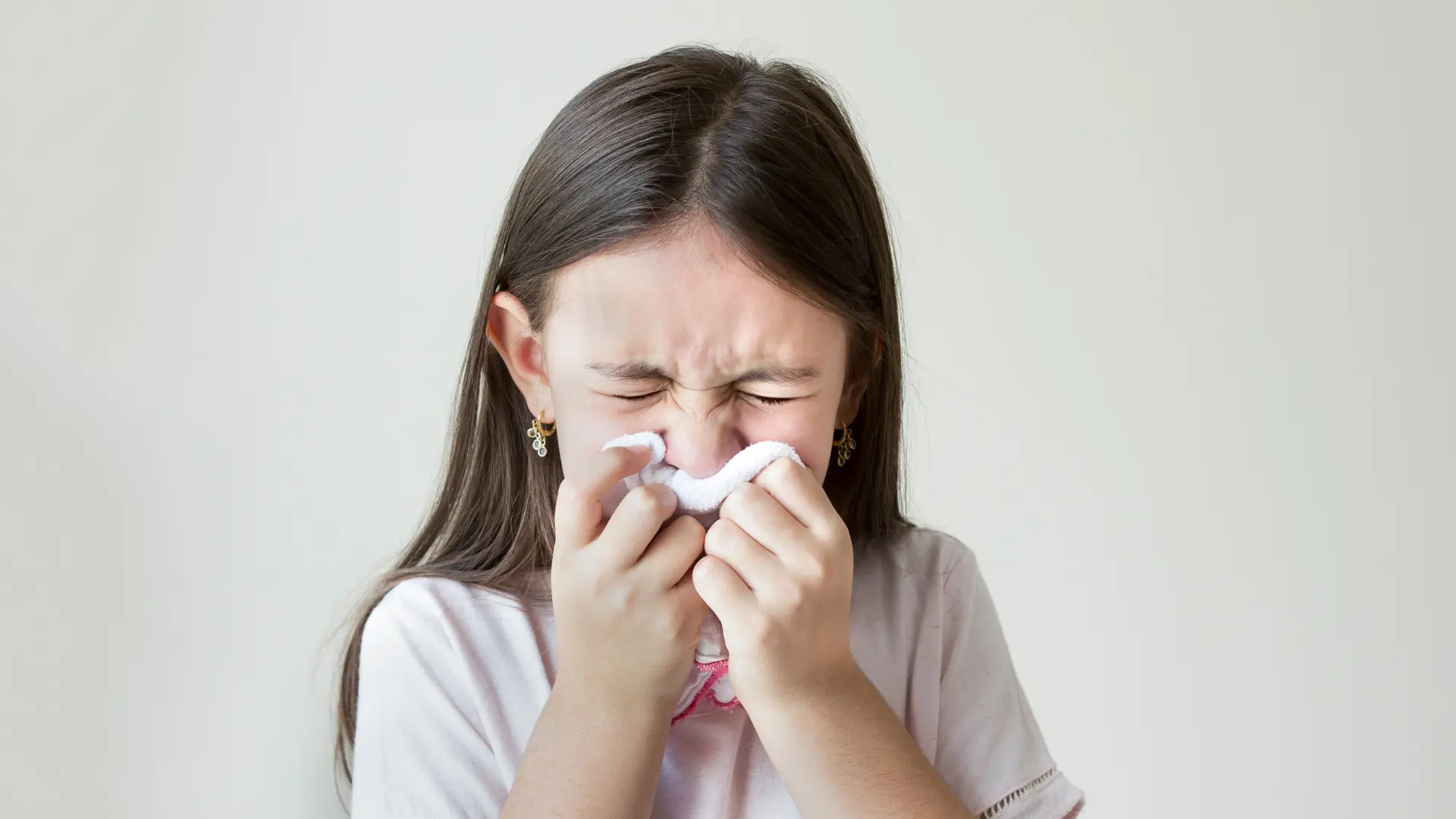As the seasons change in India, with the arrival of the monsoon rains or the cooler winter air, every parent knows what often follows: the familiar season of coughs, sniffles, and fevers. Keeping children and healthy family during this time can feel like a constant battle, and it’s natural to worry whenever your little one seems unwell.
I’m Dr. Santosh Madrewar, Senior Paediatrician and Founder of Borneo Hospital. With our dedicated paediatric departments across Thane, Nashik, Chhatrapati Sambhaji Nagar, and Raipur City, my team and I are focused on promoting preventive health to support families. We believe that with a proactive approach, you can significantly reduce the frequency and severity of seasonal illnesses and navigate them with confidence when they do occur.
This article aims to be your practical guide to keeping your family well during cold and flu season. We will focus on the most effective prevention strategies, simple tips for managing mild symptoms at home, and, most importantly, clear guidance on recognising the “red flag” symptoms that mean it’s time to see a paediatrician. Our ultimate goal is to help you maintain a happy and Healthy Family all year round.
Prevention: Your First and Best Line of Defence
The best way to handle illness is to prevent it from happening in the first place. Here are the most effective strategies for your family:
1. The Annual Flu Vaccination: Your Family’s Essential Shield
- What it is: This is a crucial point. The annual influenza (flu) vaccine is designed to protect against the specific influenza viruses predicted to be most common in the upcoming season. It is very important to understand that the flu vaccine does not prevent the common cold, which is caused by different viruses.
- Why it’s Crucial: Influenza can be a serious illness, far more severe than a common cold, especially for young children, the elderly, and pregnant women. It can lead to complications like pneumonia, bronchitis, and hospitalisation. The flu vaccine is your safest and most effective tool to prevent severe flu illness.
- Who Needs It?: The Indian Academy of Pediatrics (IAP) recommends the flu shot annually for all children from 6 months to 5 years of age. It is also highly advisable for older children, all adults, and particularly for pregnant women to protect both themselves and their newborn babies (who cannot be vaccinated until 6 months).
- When to Get It: It’s best to get vaccinated just before the flu season begins. In many parts of India, this means around May-June, ahead of the monsoon season when cases often rise. As the virus strains change each year, this vaccination is needed annually. Borneo Hospital provides the latest annual flu vaccine for your entire family.

2. Master the Art of Hand Hygiene
- The Single Most Effective Step: Teach your family that frequent and proper handwashing is the best way to stop the spread of most common viruses. Germs often enter the body when unwashed hands touch the eyes, nose, or mouth.
- When & How: Make it a non-negotiable family rule to wash hands with soap and water for at least 20 seconds at key times: after coming home from school, work, or playing outside; before eating; after using the toilet; and after coughing, sneezing, or blowing your nose. Making it a fun routine with a song can help young children learn. An alcohol-based hand sanitiser can be a good substitute when soap and water are not available.
3. Boost Immunity Through Nutrition
- Nourish to Flourish: A balanced, nutritious diet is fundamental for a strong immune system. The range of healthy foods are wide.
- Key Nutrients: Encourage a diet rich in fruits and vegetables, which are packed with antioxidants. Focus on Vitamin C-rich foods (like amla, guava, oranges, lemon) and Zinc (found in nuts, seeds, dals, beans).
- Traditional Wisdom (as Supportive Care): Many Indian households rely on traditional preparations during this season. These can be wonderfully supportive. A warm glass of turmeric milk (haldi doodh) has anti-inflammatory properties, and a comforting ginger-tulsi brew (kadha) can soothe a scratchy throat. These are excellent complements to an overall Healthy Diet.
- Hydration is Key: Ensure everyone is drinking plenty of water throughout the day to keep mucous membranes moist and help the body function optimally.
4. Prioritise Adequate Sleep
- The Body’s Repair Time: Sleep is essential for a robust immune response. Chronic lack of sleep can make both adults and children more susceptible to catching viruses. Ensure your children (and you!) are getting sufficient, age-appropriate sleep each night.
5. Keep Your Home Environment Clean
- Regularly clean and disinfect high-touch surfaces in your home, such as doorknobs, light switches, remote controls, mobile phones, and frequently used toys.
- Ensure good ventilation by opening windows when possible to allow fresh air to circulate.
6. Teach Respiratory Etiquette
- A simple but effective habit. Teach everyone in the family to cough or sneeze into their elbow or a tissue, not into their hands. Dispose of used tissues immediately and wash hands.
7. Be Mindful in Crowded Places
- During peak illness season, if possible, try to avoid very crowded, enclosed, and poorly ventilated spaces, particularly with very young infants or family members with other health conditions.
Managing Mild Symptoms at Home: The Comfort Care Toolkit
Despite our best efforts, mild illnesses will happen. When they do, focus on the three pillars of home care: Rest, Hydration, and Comfort.
- Important Disclaimer: These tips are for mild symptoms in otherwise healthy children. If your child is an infant (especially under 3 months), has a chronic health condition (like asthma or heart disease), or if you are ever in doubt, please consult your paediatrician at Borneo Hospital first.
- For a Mild Common Cold: Focus on comfort. Use saline nasal drops or spray to help clear a stuffy nose, which can make feeding and sleeping much easier. A cool-mist humidifier in the room can also help with congestion. Encourage plenty of fluids and rest.
- For a Low-Grade Fever: Dress your child in light, comfortable cotton clothing. If they are distressed, lukewarm sponging (never cold water) can provide comfort. Offer fluids frequently. You may use fever-reducing medication like paracetamol or ibuprofen, but ONLY as per the precise dosage instructions given by your paediatrician based on your child’s current age and weight. Never give aspirin to children.
- For a Mild Cough or Sore Throat: Warm fluids like clear soup or warm water can be very soothing. For children over one year of age, a small amount of honey is a safe and effective remedy to soothe a cough. Older children can try gargling with warm salt water for a sore throat.
- Nourishment During Sickness: Don’t force a child with a poor appetite to eat large meals. Focus on keeping them hydrated. Offer light, easily digestible foods they might accept, like dal-rice, khichdi, curd-rice, bananas, or toast. For infants, continue to offer breast milk or formula frequently as it provides both nutrition and hydration.
When to See a Doctor: Recognising the Red Flags
This is the most critical part for every parent. While most common Pediatric Illnesses are mild, some symptoms warrant prompt medical attention.
Trust your parental instincts. You know your child best. If you are very worried, it is always the right decision to have your child checked by a doctor.

Seek medical attention from a paediatrician at Borneo Hospital immediately if your child has:
1. Fever Concerns:
- Any fever (≥100.4°F / 38°C) in an infant under 3 months of age. This is always a reason for an urgent medical review.
- A high-grade fever (e.g., above 102-103°F or 39-39.5°C) that doesn’t improve with appropriate, correctly dosed fever-reducing medication.
- A fever that lasts for more than 3 to 5 days.
2. Breathing Difficulties:
- Breathing much faster than usual, making grunting or wheezing (a whistling sound) noises.
- You see the skin pulling in around their neck, collarbones, or ribs with each breath (retractions).
- A bluish tinge on their lips, tongue, or face.
3. Signs of Dehydration:
- Significantly reduced urination (e.g., fewer than 4 wet nappies in 24 hours for an infant).
- Dry mouth or tongue, no tears when crying, sunken-looking eyes, or a sunken fontanelle (the soft spot on a baby’s head).
- Unusual sleepiness, lack of energy, or dizziness.
4. Behavioural Changes:
- Is unusually sleepy, difficult to wake up (lethargic), or floppy.
- Is extremely irritable, fussy, and inconsolable.
5. Other Specific Symptoms:
- A severe or persistent sore throat, headache, or ear pain (your child might be tugging at their ear).
- A widespread rash, especially if it’s accompanied by fever or looks like small bruises (non-blanching).
- Symptoms that seem to be getting worse instead of improving after a few days of home care.
- Any seizure or convulsion.
- During the monsoon season in India, be aware that illnesses like dengue or malaria can also start with fever and body aches. A professional diagnosis is essential if fever is high or persistent.
Borneo Hospital: Your Partner for a Healthy Family
At Borneo Hospital, your family’s health is our priority.
- Accessible Paediatric Care: The paediatric departments at all our branches – Thane, Nashik, Chhatrapati Sambhaji Nagar, and Raipur City – led by myself and my experienced colleagues, are available for consultations to correctly diagnose and manage Pediatric Illnesses.
- Preventive Services: We are your key resource for providing essential annual flu vaccinations for your entire family, helping you stay protected.
- Emergency Readiness: Our emergency departments are well-equipped to handle more severe cases or complications arising from seasonal illnesses, providing care when you need it most.
Keeping your family healthy during cold and flu season involves a proactive approach. Prevention is always the best strategy, with the annual flu vaccine and diligent hand hygiene being your most powerful tools. For the mild illnesses that may still occur, knowing how to provide supportive care at home can make your child more comfortable and ease your own anxieties.
Most importantly, understanding the “red flag” symptoms and trusting your parental instincts empowers you to know when it’s time to seek expert medical care. By working together, we can navigate the season safely and maintain our shared goal: a happy and Healthy Family. The team at Borneo Hospital is always here to be your partner in your child’s health journey.


